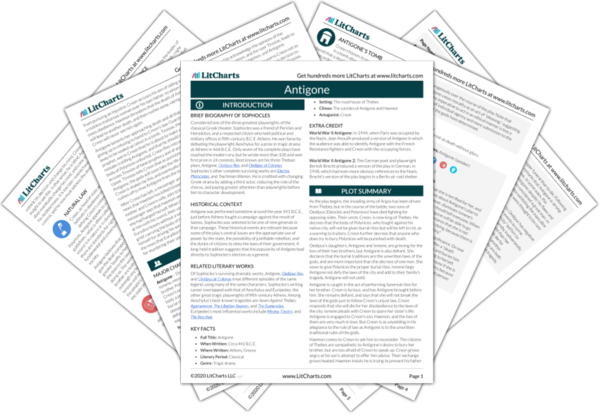Summary
Analysis
Tiresias, the blind prophet, enters, led by a young boy. Creon greets him and agrees to follow Tiresias's advice. Tiresias warns Creon that he is at a turning point, and that Polynices's body must be buried to appease the gods and protect Thebes from their wrath. Tiresias tells Creon not to be stubborn in his decision to refuse to bury Polynices. Instead, he should see himself as only human and capable of making mistakes.
Creon flies into a rage, cursing Tiresias and swearing that the body will never be buried. He accuses Tiresias of false prophecy and of accepting bribes. He curses all prophets as power-hungry.
Creon reacts to Tiresias with outrage and insults, just as Oedipus did in Oedipus Rex. His pride and rage seal his fate.
Themes
Tiresias now reveals the full secret he knows. He says that the gods alone hold sway over the dead, and that mortals may rule over the living. He says that as punishment for burying Antigone alive, the gods and the Furies will soon take the life of Creon's own child. In addition, the hatred of all those whose dead loved ones have not been buried will rise against Creon. Tiresias exits.
Creon is shaken by the prophet's words, but is reluctant to undo his decree. He asks the leader of the chorus for advice. The leader tells him to free Antigone and bury Polynices quickly. Fearful, Creon gives in. He rushes off to free Antigone himself.
Unlike Oedipus, once Creon is shaken by the words of Tiresias, he asks people around him for advice. Creon might still try to defy his terrible fate.
Themes
Get the entire Antigone LitChart as a printable PDF.

The chorus prays to the god Dionysus, asking him to protect and heal the people of Thebes.
The chorus turns to the gods, the higher power, to save Thebes.
Themes
A messenger arrives with terrible news: Haemon has killed himself. Eurydice, Haemon's mother, overhears the commotion and asks the messenger to tell her what happened. The messenger says that he and Creon first went to bury Polynices. Just as they were finishing, they heard a cry at Antigone's tomb that sounded like Haemon's voice, and rushed over. At the tomb, they found Antigone hanged and Haemon hysterical with grief for her. When Haemon saw them, he lunged at Creon with his sword, missed, and then used the sword to kill himself. Eurydice exits without a word, followed by the messenger.
As in most Greek tragedies, the climactic action takes place offstage and the audience (as well as some of the onstage characters) hear the news from a messenger. Frightened into changing his mind by the prophecy of Tiresias, Creon has tried to make up for his earlier stubbornness. But in Greek myth, once a fate is set in motion, remorse won't stop it. The fated person must suffer.
Themes
Creon and his attendants enter. Creon is carrying Haemon's body, and is almost mad with grief. He berates himself, calling himself his son's killer, and his son the victim of Creon's stupidity.
Terrible grief and suffering has made Creon realize that he has indeed angered the gods and brought this fate on himself and his family.
Themes
As Creon weeps, the messenger returns with the news that Eurydice, the queen, has killed herself. The messenger says she killed herself at an altar, while cursing Creon and his pride for causing the death of their son.
Now Creon's entire family has committed suicide. Even worse, they committed suicide because of Creon's stubborn pride.
Themes
Creon calls for his attendants to take him away. He says, "I don't even exist—I'm no one. Nothing." He prays for death. The leader of the chorus tells Creon that he must endure his suffering. Creon says that he has murdered his son and his wife. He's led offstage by his attendants. The chorus ends by remarking that the proud are laid low by fate, and wisdom is gained through suffering.
Too late, Creon realizes that his family defines him, not his position in the state. Without his family, he is "nothing." Creon's fate has turned out to be similar to Oedipus's—stubbornness led them both to fulfill a fate that results in the suicides of their loved ones. The chorus suggests that, like Oedipus, Creon will live with his suffering and gain wisdom from it.
Themes












